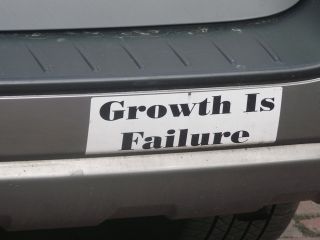May 02, 2007
Growth is Failure

I was curious about this bumper sticker, and of course went right off to the internet to see what I could pull up. In my explorations, I found an excerpt from David C. Korten's book, "When Corporations Rule the World" entitled "For the Love of Money"
The world's most powerful corporations are also active in shaping public policy in ways that virtually forces us into a pattern of overconsumption that yields large profits to themselves at the expense of our quality of living. Evidence is mounting that to make our societies sustainable we will have to restructure our systems of production and consumption to largely eliminate:. Dependence on personal automobiles;
. Long distance movement of goods and people;
. The use of chemicals in agriculture; and
. The generation of garbage that we cannot immediately recycle.In each instance, we have an opportunity to substantially increase the quality of our living while reducing our burden on the environment. Why aren't we doing it? Who wants to give over their living spaces to automobiles, take long business trips, eat contaminated foods, or live in a garbage dump?
One important reason we live this way is because it is profitable for politically powerful corporations. For example, the steel, automobile, construction, and oil companies have a major stake in policies that make survival without an automobile nearly impossible in most of our towns and cities. Chemical and agribusiness companies have had a similar stake in maintaining chemical and energy intensive agriculture systems that provide us with foods of dubious nutritional value laced with toxic poisons. Other industries benefit from encouraging our use of excessively packaged low durability products. So long as these corporate interests are allowed to dominate public policy processes, change is unlikely. Global civil society is mobilizing to reclaim the power that these interests have co-opted.
A recent juicy example of profiteering in the cavalier corporatocracy can be found in the FDA report on hog feed and melamine . The good thing about melamine is that it seems to have a quick and deadly effect, at least with pets. One doesn't have to wait for the cumulative long term effects in order to get the public's attention.
Wonder who benefits from corporate malignancy? In his op ed Hedging Disaster Robert Kuttner takes a peek at just how big the profits can get:
This past week, even jaded observers of Wall Street were startled to learn that last year's top hedge fund manager, James Simons of Renaissance Technologies, made $1.7 billion in 2006. Alpha Magazine reported that the top 25 hedge fund earners garnered an average of $570 million in 2006, up from $362 million in 2005.The burgeoning hedge fund and private equity industries are both a cause and a symptom of a dangerously lopsided America. Because they are private (not listed on stock exchanges or offering shares to the public), these funds do not have to disclose their inner workings to regulators or to the public. Yet these unregulated funds are increasingly buying and selling some of our largest corporations, stripping assets, piling on debt, leaving employees and subsequent buyers to dig out of a deep hole.
The difference between hedge funds (unregulated mutual fund s for very wealthy individuals) and private equity (privately held firms that buy and sell entire companies) is collapsing, creating an unregulated sector of wild-west financial engineering rife with conflicts of interest.
Read enough?
I certainly have.
Sorry I never found a source for the bumper sticker. You'll have to make your own, While you're at it, subscribe to "Yes!"
Photo note: As above so below